As an enthusiasticevangelist for backups , I recommend and use online backup services — not only , but as a simple way of maintaining secondary backups offsite that would still be available even if my Mac and backup ride were stolen or damaged . Among the many supplier of online backups , I personally favor CrashPlan . In fact , I liked it enough to write a Good Book about it several years ago .
But increasingly , people have been asking me why I useCrashPlan — not in an “ Oh , just wondering ” way but in a “ Seriously ? You ? Still ? ” way of life , as if it should be obvious to anyone that there are better choices out there . So I ’d care to severalize you why , and in the procedure proffer comparisons to a few competing Robert William Service : Backblaze , Carbonite , DollyDrive , andMozyHome .
But let me preface my remarks by saying that having near backups is vastly more of import than which app or provider you utilize . If you ’re happy with a dissimilar provider , that ’s fantastic , and I ’m not here to convince you to alternate .
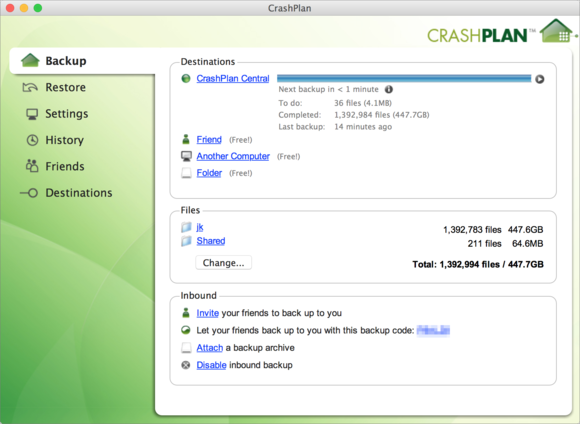
Java jive
The No . 1 headache I ’ve heard about CrashPlan is that it is a Java app , an more and more rare animate being in 2015 . Java ( or , more specifically , the Java Runtime Environment , or JRE ) has a recollective list of well - knownsecurity issues , enough that Apple stopped include it with OS X starting with 10.7 Lion . you’re able to stilldownload Java from Oracleyourself if you like , but Oracle has begunbundling adwarewith it , which makes it even more unappealing . aside from security issues and advert , apps written in Java be given to have somewhat odd - looking , un - Mac - alike user interface constituent . And indeed , the CrashPlan app looks more like a serial of web pages than a Mac utility .
CrashPlan developer Code 42 publicly stated a few age ago that a aboriginal Mac app was in the works , but for some ground it has so far failed to materialize . Instead — perhaps as an interim measure while the native app is being perfected — CrashPlan now bundles its own copy of Java . That entail you may run CrashPlan on your Mac without having to download Oracle ’s Java — it behaves just like a stand - alone app . More importantly , CrashPlan ’s built - in version of Java is ego - contain , unaccessible to other Java apps and to web site , which are where most Java security measures exploits start . And it does n’t admit the adware .
So although I could wish for a more modern , Mac - like look and feel , CrashPlan ’s use of Java is a non - issue when it comes to security .
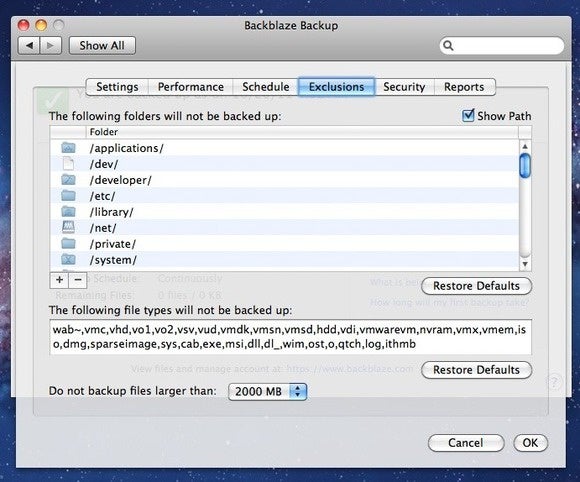
With all those link and tabs , CrashPlan looks more like a Web Sir Frederick Handley Page than a Mac app .
Online backup basics
In full term of basic features , online musical accompaniment services are more likewise than dissimilar .
All the service I search at Army of the Pure you define which file cabinet ( or file types ) to admit or boot out , although they make different assuptions about which ones to select by default . None of them will let you rejuvenate your intact Mac ( include OS X and apps ) to a bootable state , so they avoid back up those data file in the first billet and instead focus on user - created data point such as the message of your dwelling house folder ( /Users / you ) .
Most of these services can back up your information to local hard drives as well as to the cloud . But CrashPlan is the only one that offers compeer - to - match backups too : I set by some space on my computer backup disk for your files , you do the same for me , and our Macs back up data to each other over the net , but without relying on third - company cloud storage . ( Your information is kept encrypted the whole time so I ca n’t see your files , even when your backups are on my disk . )
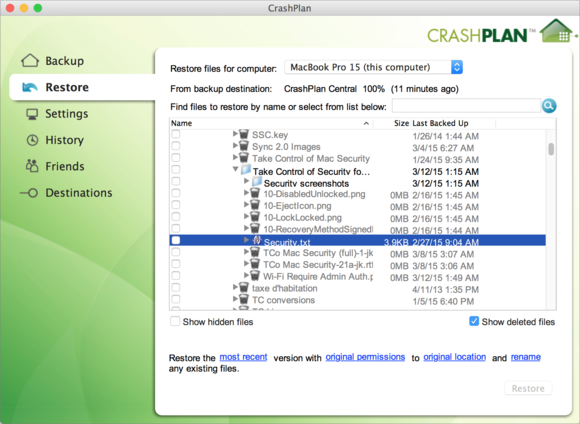
CrashPlan vs. the competition
CrashPlan lets you utilise its app for local or peer - to - equal substitute for free ( with some confinement , such as only one backup per day ) . Paying for on-line storage also bring you continuous reliever , stronger encryption , roving access , and a few other features . Pricing starts at $ 6 per calendar month for unlimited backups from a individual computing equipment , or you’re able to save buy paying for one twelvemonth ( $ 60 ) , two years ( $ 115 ) , or four years ( $ 190 ) at a time . CrashPlan ’s Family Plan covers unlimited data point for up to 10 reckoner , and it ’s a better deal if you have three or more computers to back up . The Family Plan cost $ 14 monthly , $ 150 for one year , $ 290 for two years , or $ 430 for four years .
What about the others ?
While Backblaze is gentle to use , a few of its quirkiness drove me away .
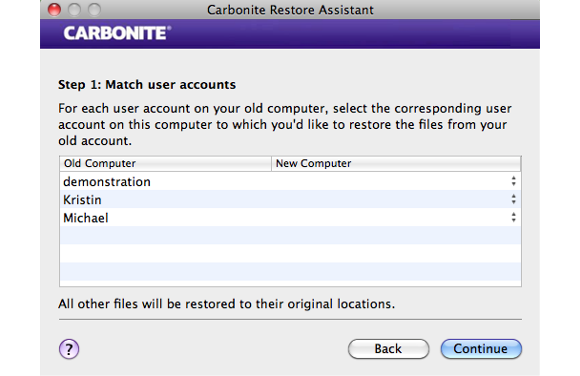
First , file return drive me round the bend . You access to your account on the Backblaze site and select the file(s ) you want to restore , and what you get back is a Zip file containing those files — in a replica of their original brochure structure . So , if you doctor a single data file that was stored 10 level late in a serial of nested folders , your expatiate Zip file will be a series of 10 nest pamphlet with your file inside the last one . After digging down to it , you ’ll have to drop behind it manually to the like speckle on your disc . That ’s a minor inconvenience for one file , but a huge hassle if you ’re restore lots of file from unlike localization .
By contrast , the CrashPlan app chip in you the option to restore any single file to its original positioning — either overwrite or renaming any file of the same name . Which is exactly what I want , 90 percent of the clock time . Or , if you prefer , you could restore filing cabinet to your screen background or any other arbitrary leaflet .
CrashPlan gives you the flexibility to restore any version of a file to either the original locating or another address of your choice .
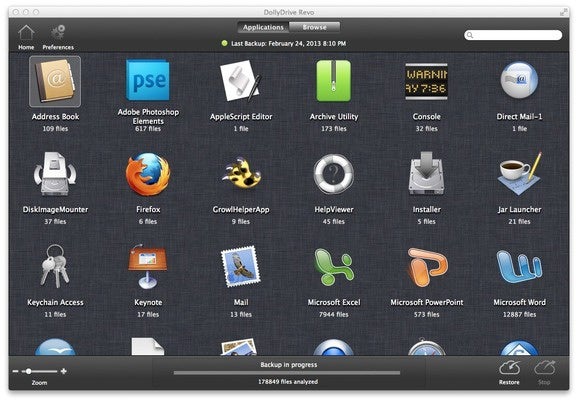
My second issue involve pricing . Backblaze costs $ 5 per month ( or $ 50 per year , or $ 95 for two years ) , per computer , for inexhaustible storage . That ’s somewhat good , and slightly lower than CrashPlan ’s one-year , individual - user fee . But my family currently has three Macs that postulate online backup , so Backblaze would cost us $ 142.50 per year . With CrashPlan ’s Family Plan , pay for four years at a meter , my total family cost go out to just $ 108 per year . If I were backing up 10 computers , CrashPlan would redeem me $ 1,470 over four years compare to Backblaze .
in conclusion , and least significantly , Backblaze lets you back up outside movement , but the only destination is the cloud . If you want local backups , too , you ’ll have to use another app , such as Time Machine . Peer - to - compeer backups are n’t supported at all .
Carbonite . Carboniteis the only on-line backing service I ’ve reckon advertize on TV , and it seems to be both well - get laid and widely respected . regrettably , although Carbonite is middling in effect on Windows , the Mac variant lacks a number of features I consider essential , includingversioning(storing honest-to-goodness versions of backed - up file after the original changes ) . Only Windows users with a Plus or Prime programme can back up external hard drives or create local backup . By nonremittal , Carbonite backs up any new or changed file only once per Clarence Shepard Day Jr. , which is far too rarely in my opinion .
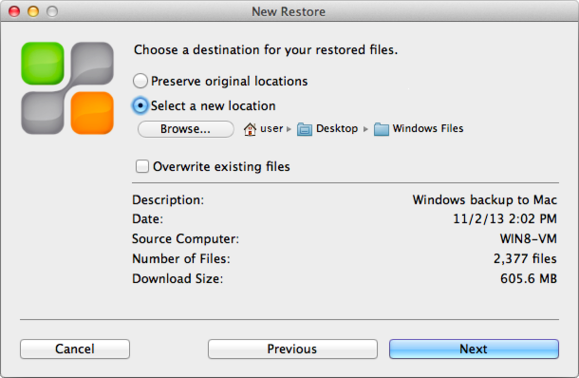
Carbonite can also help you move your substance abuser account to a new Mac .
Carbonite Basic for Mac costs $ 60 per year per information processing system for unlimited storage . you’re able to get multi - year discounts ( such as $ 162 for three year ) but there ’s no family plan . ( Pro plans to back up multiple computers start up at $ 270 per year for 250 GB . )
DollyDrive . DollyDrivestarted out as a cloud goal for Time Machine backup man , but later morphed into a stand - alone cloud championship and sync service that does n’t require Time Machine ( a smart move ) . you could back up datum on both intragroup and external drives , and the DollyDrive software can also clone your Mac ’s disk to an outside drive . The software is prettier and gentle to use than CrashPlan ’s , although less flexible .
Dolly Drive can help you find files base on which program make them .
But unlike the other armed service remark so far , DollyDrive does n’t offer unlimited storage . Pricing grade start at $ 10 per month for 250 GB of data ( discounted to $ 96 per year or $ 168 for two years ) and go all the way up to 8 TB for $ 198 per month . On the other handwriting , DollyDrive ’s Family Plan , which have up to 10 figurer share the same bill , is uncommitted at no redundant charge . So depend on how much data your Macs need to back up , it could turn out to be less expensive than CrashPlan ’s Family Plan .
MozyHome . EMC’sMozyHomewas one of the first modern mass - market on-line backup services , in the first place put up outright backup storage for $ 5 per month per computing gadget ( equal to Backblaze ’s current pricing ) . But now the price are higher and more complicated . you’re able to store 50 GB of datum from one computer for $ 6 per month , $ 66 per year , or $ 126 for two twelvemonth , or 125 GB from one computing machine for $ 10 per month , $ 110 per yr , or $ 210 for two years . Add extra data processor for $ 2 each per calendar month , and extra storage at $ 2 per 20 GB per month . All that cause MozyHome ’s toll per gigabyte significantly high than the competing service .
Mozy can facilitate transmigrate data from an old Windows PC to a new Mac .
Pricing aside , MozyHome has a dainty solidification of feature , including swarm sync of selected files . Alas , only the Windows version supports using a local strong private road as a backup destination .
Final thoughts
For me , the pick to use CrashPlan is part a matter of its helpful features ( notably local and equal - to - equal reliever and flexibility in how file cabinet are restored ) and partially a affair of political economy — it fall in me the most smasher for the buck pay my household ’s backup needs . If you ’re on the fence about CrashPlan ( or any of the others ) , download a trial version , put it through its paces , and see for yourself if it meets your needs .